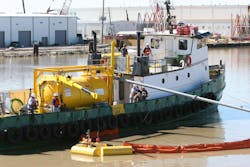BSEE report highlights response preparedness
Offshore staff
WASHINGTON, D.C. – The Bureau of Safety and Environmental Enforcement (BSEE) has published its inaugural report that summarizes the key lessons learned from 2018 and 2019 government initiated unannounced exercises on the US outer continental shelf.
The inaugural report, whose purpose is to improve domestic and international response preparedness, summarizes the key lessons learned from 28 exercises conducted in calendar years 2018 and 2019. The report focuses on three elements – Operator Lessons Learned, Operator Best Practices, and BSEE Lessons Learned, and serves to assist contingency planners and emergency responders with improving their processes and deliverables for addressing offshore responses.
“BSEE continues to develop effective ways to enhance preparedness,” said Director Scott Angelle. “Over time, these annual summaries will provide BSEE and industry with data that can be used to identify trends and emerging issues that affect our nation’s offshore environment.”
During government initiated unannounced exercises, BSEE preparedness analysts witness and evaluate, a plan holder’s capabilities to effectively use public and private equipment, resources, and staff. Offshore facility owners and operators maintain response plans that document their resources and capabilities for responding to an offshore incident.
BSEE regularly plans and executes unannounced exercises in close coordination with federal partners, such as the US Coast Guard and the Pipeline and Hazardous Materials Safety Administration, and state government partners. After each exercise, BSEE documents lessons learned based on categories adapted from the Homeland Security Exercise and Evaluation Program classification system.
During the Trump administration, the bureau has employed 54 of these exercises as a tool for verifying the proficiencies of owners/operators, and the contractors on which they rely, in following their approved response plans.
06/26/2020
